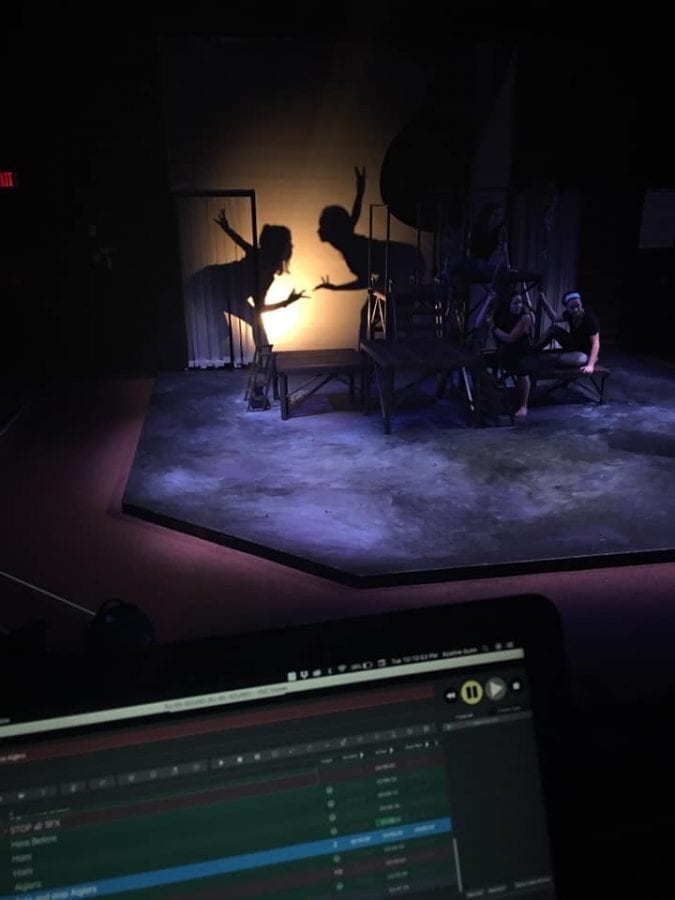Ancient Greek show continues to intrigue viewers
February 18, 2019
Widely considered the best tragedy of all time, “Bakkhai” features confusing messages of Euripides’ ancient masterpiece and continues to intrigue audiences today.
“Bakkhai” tells a story centered on Dionysus, the god of wine, theater and ritual festivities. He arrives in Thebes disguised as a mortal, aiming to punish King Pentheus and his family for banning Dionysian worship in the city. The play soon spirals out of control as Dionysus’ trickster-like persona becomes vengeful, ultimately ending in tragedy for the entire city of Thebes.
Elizabeth Kirkland, a third year MFA directing candidate at The University of Alabama, directed “Bakkhai.” Kirkland also directed “Little Women” earlier this season, saying that the idea of transformation has been constant through the productions in the Allen Bales Theatre.
“There are several dualities present in the play,” Kirkland said. “Man versus nature, God versus man, law versus chaos, masculine versus feminine is a big one. Toxic masculinity is also present throughout the play, so that gives people a lot of fuel for discussion.”
Kirkland had the idea to bring in UA professor Tatiana Summers for a talk back, a conversation between the audience and the cast of a show. Summers, a native of Greece and long-time professor of classics, gave her interpretation of “Bakkhai” and answered historical questions. Kirkland and the cast also fielded questions about the creative process and their presentation of the play.
“This play was written in 410 B.C., which places it in the golden age of Greece,” Summers said. “They wanted to understand the world and they were asking questions, but on the other side they had this religion and gods that were very strange. They were very rational people, but had a very irrational religion. … That conflict is what is brought out in this play in the most tragic of ways.”
Audience members had a variety of questions for Kirkland, Summers and the cast. Such questions prompted the discussion of “Bakkhai” as a gender commentary, and the creation of the show’s choreography and the chemistry among the players revealed a myriad of interpretations among the viewers.
“I think we saw these characters worshipping this god that became too powerful,” said Daisy Ford, a junior majoring in political science. “But when they realized the god was too powerful, he punished them for their fear. … I have these sorts of conversations with people who worship any type of god, whatever religion they have, to make sure they still use rational thinking… to use their religious text as a suggestive guide, but not as their entire life, or else something like the events in the play would happen.”
“Bakkhai” subverts the traditional structure of a tragedy in that the audience does not easily learn from the tragic hero’s mistakes, Summers said. The conflict of rational versus irrational and the lack of a conclusive ending leave the audience with burning questions.
After the fall of Rome, 19t- century critics like Friedrich Nietzsche were the first to re-examine “Bakkhai.” It saw a resurgence in 20th-century theater but is still a play not often performed, Kirkland said.
“I think there’s a lot of value in having a modern audience see something so old in a new setting and atmosphere,” Kirkland said. “It’s a translation by poet Anne Carson, and she loves to transform her Greek material into almost a piece of music with how she shapes the words, and it’s also a little modernized. … ‘Bakkhai’ is considered a coveted, but also dangerous piece to direct because there’s a lot of stuff you have to work through and be sure to present it genuinely.”
With the many conflicting interpretations of “Bakkhai,” it is sure to continue creating debate among those who saw it. UA Theatre and Dance continues to leave their audiences with weighty questions of religion, race and gender through this season’s productions.
“I think the play is about respecting the natural order of things, about respecting the boundaries between yourself and the world around you,” said Marissa Swanner, a junior double majoring in musical theatre and dance.
Swanner portrays one of the titular Bakkhai, a chorus of Dionysian worshippers who narrate the play.
“I think this play will have a shocking effect, but I think it’s beautiful in its accessibility to a modern American audience,” Swanner said. “It’s a great way to dip your toe into the realm of Greek theater.”





















